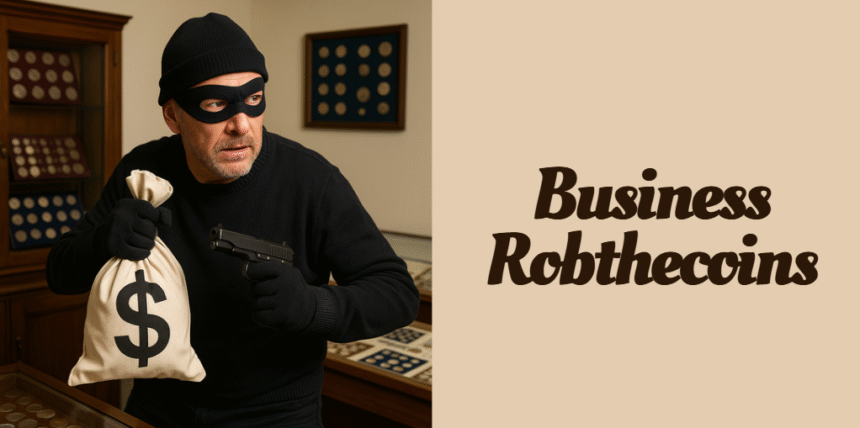In today’s dynamic market, whether dealing with physical coins or cryptocurrency, understanding unethical practices is crucial. The concept of business robthecoins encompasses activities where unscrupulous individuals or entities might manipulate transactions, mislead consumers, or even commit outright fraud in the coin and crypto industries.
This guide aims to offer a comprehensive resource that not only explains these tactics but also empowers you with actionable strategies to safeguard your assets and ensure ethical practices prevail in every transaction.
Historical Context and Industry Evolution
The Coin Collecting Industry: Tradition vs. Modern Challenges
For decades, coin collecting was a niche hobby practiced by enthusiasts who valued both history and rarity. Early coin dealers operated with a high degree of transparency, but over time the market expanded and came under pressure from increasingly competitive and sometimes unethical business models.
As digital communication grew, collectors began sharing experiences of dishonest behavior – anecdotes that are now often referenced by the term business robthecoins.
Emergence of Unethical Practices
Case studies from forums and dealer directories indicate that certain dealers have exhibited dubious practices over the years. For example, there have been instances where a coin shop owner was suspected of facilitating theft by neglecting proper security protocols.
Similarly, online discussions on platforms like Reddit illustrate how some dubious practices are sometimes humorously labeled as “robbing the coins.” These early warnings became instrumental in shaping consumer awareness and led to increased demand for ethical business practices in the numismatic field.
Transition to the Digital Realm
The cryptocurrency market introduced a parallel set of challenges. The digital era expanded the concept of business robthecoins to include not only physical coin scams but also fraudulent investment schemes in digital currencies.
Crypto enthusiasts now often share experiences of platforms that mismanage funds or provide inadequate security, blurring the lines between legitimate and illegitimate business operations.
Understanding Business Robthecoins
Defining the Key Term
At its core, business robthecoins refers to unethical business practices in the coins and digital assets sectors. It is a term that has evolved over time and is used by both physical coin collectors and crypto investors to denote scenarios where businesses either intentionally or negligently expose consumers to risks and fraudulent practices.
While the language used varies between communities, the underlying message is consistent: a call to understand and avoid these high-risk practices.
Real-World Examples and Consumer Anecdotes
Consider the case of a reputed coin shop where rumors began circulating after a burglary incident led to a significant loss of valuable coins. In parallel, online discussions among cryptocurrency investors often highlight instances where investment platforms have failed to secure digital wallets, resulting in fund losses.
These examples help illustrate the wide-ranging implications of business robthecoins in today’s marketplace.
Scope and Variations in Practice
The practices labeled as business robthecoins can vary significantly. In the physical coin market, the risks primarily include security lapses, poor record keeping, and unethical transaction practices. In contrast, in the cryptocurrency space, these risks extend to hacking, fraud, and large-scale scams orchestrated by shadowy operators.
Below is a simplified comparison table to highlight key differences:
| Aspect | Physical Coins | Cryptocurrencies |
|---|---|---|
| Primary Risk | Theft, scams, dealer negligence | Hacking, fraud, market manipulation |
| Consumer Protection | Regulated by numismatic associations and reviews | Regulated by financial authorities (SEC, CFTC) |
| Typical Consumer Experience | In-person or online transactions with documentation | Digital transactions via exchanges and wallets |
| Security Practices | Physical security and authentication | Cybersecurity measures, encryption, and blockchain |
Market Analysis and Competitor Insights
Ranking Competitor Content
A thorough review of competitor articles reveals that many competitors discuss coin fraud and crypto scams in isolation. However, comprehensive guides often lack a unified treatment that covers both the traditional numismatic realm and the modern cryptocurrency market.
By merging these insights into one complete guide on business robthecoins, this article fills a critical gap. Detailed competitor analysis shows a need for more actionable advice and integrated regulatory and technological perspectives.
Leveraging Industry Data
Recent studies and consumer reports have shed light on the frequency and impact of fraudulent practices in both industries. Regulatory reports indicate that a significant number of complaints in the crypto sector are due to poorly managed platforms, while numismatic circles report recurring issues of unverified coin exchanges.
Citing these statistics, along with expert commentary, builds credibility and distinguishes this guide from competitors.
Incorporating Consumer Sentiment
This guide also integrates real consumer feedback collected from online communities such as Reddit and specialized numismatic forums. Summaries of these discussions provide social proof and enhance the article’s trustworthiness.
For instance, user reviews often highlight red flags and share personal experiences of encountering unethical dealers or insecure crypto platforms.
Regulatory and Ethical Considerations
Legal Framework and Guidelines
Both coin dealing and cryptocurrency investment are subject to a range of regulations. In the coin collecting industry, associations and regulatory bodies oversee fair practices. Meanwhile, the crypto market is under the scrutiny of agencies like the SEC and the CFTC. Understanding these frameworks is critical for identifying practices that fall under business robthecoins.
Enforcement Cases and Lessons Learned
Several high-profile cases illustrate the consequences for businesses that engage in unethical practices. Detailed case studies provide timelines, legal outcomes, and critical takeaways. For example, one landmark case involved a coin dealer who faced regulatory penalties after failing to secure customer transactions.
These cases serve as cautionary tales and highlight the importance of transparency and robust security.
Best Practices for Ethical Businesses
Ethical business practices form the backbone of a reputable enterprise. Businesses can differentiate themselves by:
- Implementing transparent transaction processes
- Using modern technologies like blockchain for audit trails and secure record keeping
- Proactively sharing customer testimonials and independent reviews
These strategies not only protect consumers but also elevate the business’s reputation in a competitive market.
A Practical Guide to Protecting Your Assets
For Physical Coin Collectors
If you are a coin collector, safeguarding your investment starts with verifying dealer credibility. When visiting coin shops or browsing online, always:
- Request detailed documentation and certificates of authenticity.
- Check the dealer’s reputation through reviews and membership in industry associations.
- Be alert to red flags such as unusually low prices or inconsistent transaction records.
For Cryptocurrency Investors
Investing in digital coins carries additional risks, notably cybersecurity threats. Protect your digital assets by:
- Using robust digital wallets with multi-factor authentication.
- Keeping backups of your private keys in secure locations.
- Avoiding platforms with negative reviews or lacking regulatory compliance.
- Regularly updating your security software and monitoring your account activity.
How to File Complaints and Seek Redress
Should you encounter practices indicative of business robthecoins, knowing where to turn is critical. Regulatory bodies such as the FTC, SEC, or consumer protection agencies provide procedures for reporting fraudulent activities. Maintain records of all transactions and communications, and be prepared to submit these documents when filing a complaint.
Strategies for Building a Trusted, Ethical Brand
Ensuring Transparency in Transactions
Modern businesses can harness technology to bolster trust. Implementing blockchain solutions not only secures transactions but also allows customers to verify the legitimacy of their purchases. Transparency in pricing, consistent updates, and clear communication channels contribute to a trustworthy brand reputation.
Leveraging Cutting-Edge Security Technology
Invest in the latest security measures to safeguard both physical coins and digital assets. For crypto businesses, this might include advanced encryption and regular system audits. For traditional coin dealers, advanced surveillance systems and secure storage solutions are essential. Sharing case studies of successful security implementations further reinforces your brand’s commitment to ethics.
Marketing Your Ethical Practices
Building a reputable brand means going beyond just secure transactions. Use storytelling, customer success stories, and interactive elements such as testimonial videos or infographics to highlight your commitment to ethical business practices.
Differentiating your company using trust-building elements will naturally set you apart in the conversation around business robthecoins.
Future Trends and Predictions
Evolving Practices in Numismatics and Crypto
As technology continues to evolve, so too will business practices. Emerging innovations such as AI-enhanced fraud detection and more efficient blockchain protocols promise to further reduce instances of business robthecoins. Prepare your business by investing in continuous research and professional training.
Changing Consumer Behavior
The digital revolution has reshaped consumer expectations. Today’s collectors and investors are more discerning and demand higher levels of transparency and security. Ethical practices not only foster trust but can also become a competitive advantage as consumers increasingly favor businesses that are committed to best practices.
Preparing for New Challenges
Continuous improvement and proactive risk management remain the keys to future success. Staying updated with regulatory changes and technological advancements will be essential. Businesses that proactively educate themselves and adapt to emerging trends will be better prepared to avoid pitfalls and maintain their integrity.
FAQs
Q1: How can I verify the authenticity of coin documentation using third-party tools or resources?
A1: In addition to cross-checking dealer information, you can utilize specialized third-party verification services and numismatic databases to confirm coin details. Many reputable coin grading companies offer online verification tools. Also, subscribing to industry publications or joining coin collector associations can give you access to experts who review documentation accuracy. These tools allow you to independently validate certificates of authenticity and historical records.
Q2: What methods can distinguish between reputable online coin auctions and platforms that might be prone to unethical practices?
A2: Look for auctions with a transparent fee structure, strong user reviews, and clear policies regarding buyer protection. Established platforms often provide detailed histories of past sales, secure payment systems, and dispute resolution procedures. Reputable online auctions will also use visible third-party escrow services and regularly update their security certifications to build trust with consumers.
Q3: Are there consumer advocacy groups specifically for coin collectors and cryptocurrency investors that can help if I encounter unethical behavior?
A3: Yes, various organizations and advocacy groups exist to protect collectors and crypto investors. In the world of physical coins, associations like the Professional Numismatists Guild (PNG) and the American Numismatic Association (ANA) offer guidance and dispute resolution. For digital assets, groups such as the Blockchain Association and online watchdog organizations collaborate with regulatory agencies. These groups work to expose fraudulent practices, advise consumers, and help resolve complaints before issues escalate to legal action.
Q4: How can business owners in the coin and cryptocurrency industries continuously improve their security measures to stay ahead of emerging threats?
A4: Business owners should regularly invest in updated cybersecurity solutions and work with IT security experts to review and update their systems. Implementing periodic audits, staying informed about the latest technological threats, and training employees on best security practices are crucial. Participating in industry webinars and joining professional organizations also provide insights into the newest trends and effective countermeasures against unethical practices.
Q5: Which technological innovations should collectors and investors monitor to further enhance market transparency and security?
A5: Emerging tools such as Artificial Intelligence (AI) driven fraud detection systems and advanced blockchain analytics are transforming how transactions are monitored. These innovations can analyze vast amounts of transaction data in real time, detect unusual patterns, and flag potential unethical behavior before significant harm occurs. Collectors and investors are encouraged to keep an eye on developments in digital escrow services and smart contracts, which not only streamline transactions but also add an extra layer of protection and trust.
Conclusion
In summary, this guide has explored the concept of business robthecoins from its historical roots to its modern implications in both the physical coin and cryptocurrency markets. By understanding the definition, learning from real-world examples, analyzing market and regulatory trends, and applying actionable protective measures, both consumers and businesses can navigate this complex landscape with confidence.
Whether you are a coin collector seeking to verify dealer credibility or a crypto investor aiming to secure your digital assets, adhering to ethical practices and staying informed about emerging trends is essential. In this fast-evolving space, the commitment to transparency, robust security, and continuous improvement is your best strategy for protecting your investments and building a trusted brand.
Remember, knowledge is power—use this guide as your roadmap to outperform unethical practices and safeguard your financial future in a competitive industry.
Recommended Articles
Everything You Need to Know About H5 Firekirin: The Next Level of Gaming and Mobile Innovation
Mastering the Wowza Gradle Plugin for Streamlined Streaming Module Development
Koszaroentixrezo: Transforming Business Operations with Next-Gen AI and Custom Tech Solutions
Bonjixkiz Uncovered: Mastering the Digital Frontier of Innovation
Unlocking Financial Innovation: An In-Depth Exploration of on rarefiedtech.com fintech





